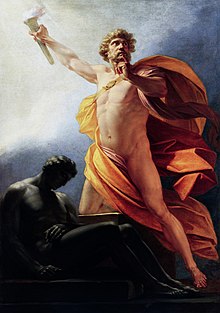Hubris
The hubris (in ancient Greek ὕβρις hýbris) is a Greek concept that can be translated as 'excess' of pride and arrogance. It does not refer to an irrational and unbalanced impulse, but to an attempt to transgress the limits imposed by the gods on mortal and earthly men. In Ancient Greece, it alluded to a reckless contempt for the personal space of others together with the lack of control of one's own impulses, being a violent feeling inspired by exaggerated passions, considered diseases due to their irrational and unbalanced nature, and more specifically by Ate (the anger or pride). As the famous ancient proverb, wrongly attributed to Euripides, says: "He whom the gods want to destroy, they first drive mad."
In short, hybris or hubris is a punishment cast by the gods.
Hubris in antiquity
Greek religion ignored the concept of sin as conceived by Christianity, so hubris was considered the main fault. It is related to the concept of moira, which in Greek means 'fate', 'part', 'lot' and 'portion' simultaneously. Fate is the lot, the part of happiness or misfortune, fortune or misfortune, life or death, which corresponds to each one according to their social position and their relationship with gods and men (see the article moira the division of the world carried out by the three great Crónidas, which determines the destiny of each one). Now, the person who commits hubris is guilty of wanting more than the part that was assigned to him in the division of destiny. Excess designates the fact of wanting more than the fair measure that destiny assigns. The punishment for the hubris is the nemesis, the punishment of the gods that has the effect of returning the individual within the limits that he crossed.
Herodotus expresses it clearly in a significant passage:
You can observe how divinity flinches with its rays to beings who stand out too much, without allowing them to boast of their condition; instead, the little ones do not awake their wrath. You can also observe how he always throws his darts from the sky against the greatest buildings and the tallest trees, because the divinity tends to lower everything he discovers too much.
The conception of hubris as a lack determines Greek morality as a morality of measure, moderation and sobriety, obeying the proverb pan metron, which literally means 'the measure in all things' ', or better still 'never too much' or 'always enough'. Man must remain aware of his place in the universe, that is, both his social position in a hierarchical society and his mortality before the immortal gods.
Hubris is a common theme in mythology, Greek tragedies, and pre-Socratic thought, whose stories often included protagonists who suffered from hubris and ended up being punished by the gods for it. In Hesiod's Theogony, the different races of men (bronze, iron, etc.) that follow one after the other condemn each other for their hubris. In a certain way, the lack of Agamemnon in the first book of the Iliad is related to the hubris in dispossessing Achilles of the part of the booty that should correspond to him in justice. On his part, Heraclitus shows the hubris as the signaling of a fault towards the Nous or legal god: «The Sun will not go beyond his measurements, otherwise the Erinyes, assistants of the Dice, will discover it». However, Heraclitus thinks that as long as there is discord, the parts can be merged into the One. Therefore, here the hubris is a flow of opposites, making life possible.
In Greek law, hubris most often refers to drunken violence by the powerful towards the weak. In poetry and mythology, the term was applied to those individuals who considered themselves equal to or superior to the gods. The hubris was often the hamartia ('tragic mistake') of the characters in Greek dramas.
The goddess Hibris
There was also a goddess called Hibris (or Hybris), the personification of the above concept: insolence and lack of restraint and instinct. Hubris spent most of her time among mortals. According to Higino, she was the daughter of Erebo and Night. Other authors attribute the motherhood of Coro to her, the personification of disdain.
Examples of hubris
Greek and Roman mythological characters punished for their hubris:
In the Bible the topic of punishment for arrogance also appears:
- Adam and Eve were tempted to be as God and therefore expelled from the Garden of Eden.
- The Tower of Babel was built to reach heaven, but God destroyed it.
Hubris today
The modern negative consequences of actions caused by hubris seem to be associated with a lack of knowledge, interest and study of history, combined with an overconfidence and a lack of humility.
The British historian Arnold J. Toynbee (1889-1975), in his voluminous Study of History (1933-1961), uses the concept of hubris to explain a possible cause of the collapse of the civilizations, as an active variant of the nemesis of creativity.
Hubris has been suggested to be one of the three qualities of successful programmers, according to Larry Wall. It would be "the quality that makes you write (and maintain) programs that other people don't want to talk bad about." The other two would be laziness and impatience.
Contenido relacionado
John ruskin
Difference
George Berkeley

